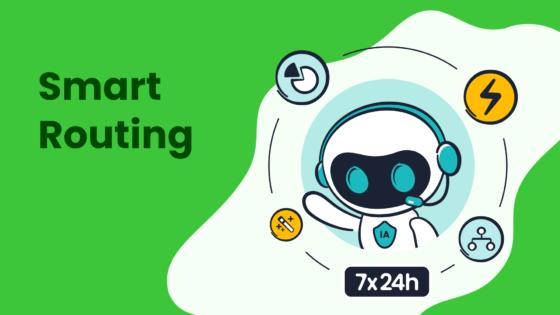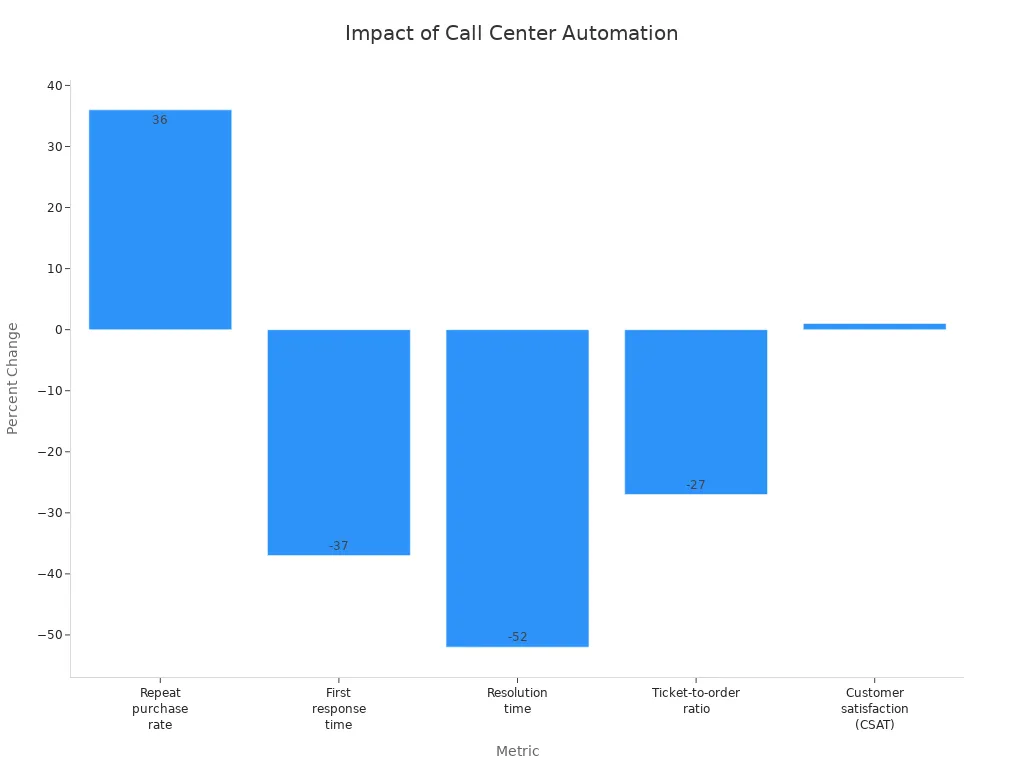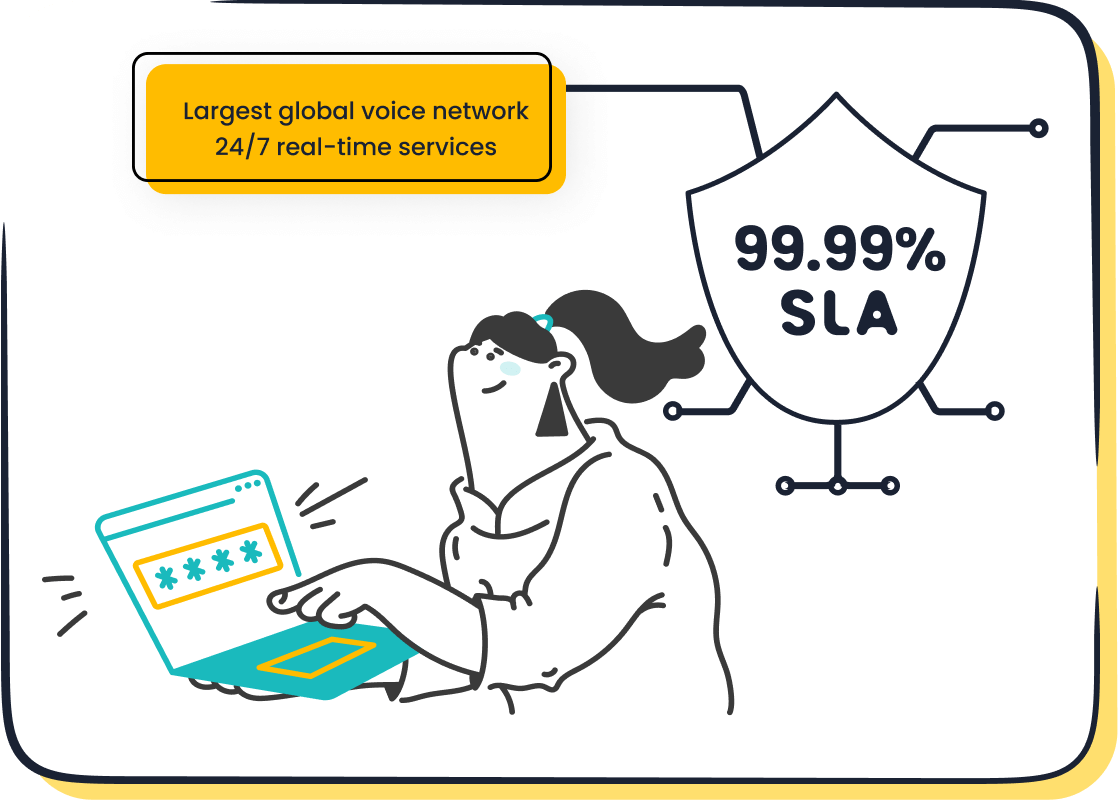Call Center Automation Trends Shaping the Future of Customer Service

By 2030, over 95% of contact centers will use advanced AI systems, resolving up to 70% of calls without human help. The most significant call center automation trends for 2025 include AI-driven agent assist, predictive routing, generative AI, and omnichannel integration. These trends drive digital transformation, reduce response times, and improve customer experience. Companies like Sobot lead this transformation, providing Sobot AI and Sobot call center solutions that unify customer service automation and boost operational efficiency. Automation and digital transformation empower customers and agents, shaping the future of customer service and contact center operations.

Call Center Automation Overview

Definition
Call center automation uses advanced technologies to manage customer interactions and streamline workflows. Industry leaders define contact center automation as the integration of AI, machine learning, robotic process automation, natural language processing, and cloud computing. These systems automate repetitive tasks, manage inquiries, and connect with CRM platforms to improve efficiency.
Contact center automation helps agents focus on complex problems while routine questions are handled by automated systems. This approach reduces costs, increases first call resolution rates, and improves customer satisfaction. Modern contact centers use automation to deliver faster, personalized responses and self-service options like chatbots and IVR. Sobot stands out as a leader in integrated contact center automation, offering solutions that unify customer service automation across channels and industries.
Core Technologies
Contact center automation relies on several core technologies that drive better outcomes for businesses and customers.
- Artificial Intelligence (AI): AI-powered sentiment analysis detects emotions, helping agents resolve issues quickly.
- Machine Learning (ML): ML learns from data to predict customer needs and improve service.
- Natural Language Processing (NLP): NLP understands and responds to human language, enabling chatbots and virtual assistants to handle 60-80% of routine inquiries.
- Robotic Process Automation (RPA): RPA automates manual processes, reducing errors and saving time.
- Voice Recognition: This technology transcribes calls and analyzes sentiment for better insights.
- Predictive Analytics: Predicts call volumes and optimizes staffing, reducing overtime costs.
- Automated Quality Assurance: Monitors all calls, improving compliance and agent performance.
| Technology | Benefit | Example Use Case |
|---|---|---|
| AI & ML | Personalized service | Sobot’s AI-powered chatbot |
| NLP | Real-time language understanding | Chatbots, sentiment analysis |
| RPA | Workflow automation | Ticketing, outbound tasks |
| Voice Recognition | Sentiment detection | Call transcription |
Sobot’s contact center automation platform combines these technologies to deliver unified workspaces, smart routing, and real-time analytics, supporting over 10,000 brands worldwide.
Industry Standards
Industry standards for contact center automation ensure quality, compliance, and security.
- Structured quality assurance frameworks include call recording, monitoring, scoring, and agent training.
- Key metrics tracked are Average Handle Time (AHT), Compliance Rates, Call Quality Scores, Customer Satisfaction (CSAT), and First Call Resolution (FCR).
- Automated QA software and dashboards streamline evaluations and maintain compliance.
- Regular feedback and coaching help agents improve skills.
- Training programs cover technical and soft skills, ensuring agents meet quality expectations.
- Compliance with regulations such as PCI DSS, HIPAA, and TCPA protects sensitive data and maintains trust.
Sobot’s contact center automation solutions follow strict security protocols, including encrypted data transfer and 99.99% uptime. The company’s secure AI and regional data centers support compliance with international standards, making Sobot a trusted partner for customer service automation.
Contact Center Trends for 2025
Contact center automation continues to evolve rapidly, driven by new technologies and changing customer expectations. Market research and expert analysis highlight several automation trends that will shape the future of customer service. Companies now prioritize intelligent automation to streamline workflows, improve customer satisfaction, and reduce operational costs. Sobot’s Voice/Call Center platform exemplifies these trends, offering advanced features that support businesses in adapting to the latest contact center trends.
AI Agent Assist
AI agent assist stands at the forefront of contact center automation. This technology empowers agents by providing real-time support during customer interactions. AI-powered agent assistance integrates with platforms like CRM systems, communication tools, and knowledge bases. It analyzes spoken and written language to understand context and intent, using natural language processing (NLP) to evaluate sentiment, tone, and urgency.
AI agent assist does not replace human agents. It enhances their capabilities, allowing them to focus on complex issues while AI handles routine tasks.
Key benefits of AI agent assist include:
- Real-time suggestions for responses, knowledge articles, and upsell opportunities.
- Automated call summarization and data entry, reducing manual workload.
- Machine learning that improves accuracy and relevance based on past interactions.
- Integration with CRM and knowledge bases for instant access to policies, order history, and reply templates.
- Automated scorecards and performance insights for smarter coaching and quality assurance.
Agents receive actionable insights during live conversations, enabling faster and more accurate responses. Generative AI helps craft clear, professional, and personalized messages, improving communication quality. Automated call summaries save time and help managers review interactions efficiently. These capabilities shorten training and onboarding, reduce agent stress, and accelerate productivity.

Sobot’s Voice/Call Center product leverages AI-powered agent assistance to support agents with intelligent recommendations, automated note-taking, and real-time analytics. The unified workspace consolidates customer information, allowing agents to deliver consistent and personalized service. Sobot’s AI-driven automation reduces response times and improves customer satisfaction, aligning with the latest contact center automation trends.
Predictive Routing
Predictive routing represents a significant advancement in contact center automation. This technology uses AI algorithms to analyze incoming call data, customer history, inquiry nature, and agent skills. It connects callers with the best-suited agents, reducing wait times and increasing first-call resolution rates.
Predictive routing adapts dynamically to changing conditions, ensuring efficient call handling and a better experience for both customers and businesses.
The main advantages of predictive routing include:
- Intelligent call distribution based on agent workload, expertise, and queue status.
- Routing customers to agents with the appropriate skills, minimizing hold times and reducing call abandonment.
- Accurate wait time estimates that set realistic expectations for customers.
- Matching customers with the right agent from the first interaction, improving resolution rates.
- Routing calls by inquiry type and complexity to specialists, reducing transfers and callbacks.
Healthcare providers report up to a 17% increase in patient satisfaction after adopting predictive routing. Bank of America demonstrates shorter wait times and better call resolutions, showing the technology’s applicability across industries. Predictive routing automates routine tasks, freeing agents to focus on complex interactions and improving operational efficiency.
Sobot’s Voice/Call Center platform features intelligent call routing, which uses AI to analyze customer data and direct calls to the most suitable agents or teams. The system supports global telephony contacts and offers smart call routing based on time zone, inquiry type, and agent availability. Sobot’s intelligent automation ensures that customers reach the right agent quickly, reducing wait times and improving resolution rates. The platform’s real-time monitoring and analysis provide insights that help businesses optimize their contact center operations.
Generative AI
Generative AI transforms contact center automation by automating responses to frequently asked questions and enabling agents to focus on complex queries. This technology uses natural language understanding to interpret customer intent and sentiment, improving the accuracy and relevance of responses.
Generative AI acts as an intelligent copilot for agents, suggesting responses, highlighting relevant knowledge, and recommending next best actions in real time.
Generative AI in contact centers offers several benefits:
- Automates routine customer interactions such as FAQs, order updates, and account changes using AI-powered chatbots and voice assistants.
- Assists agents with real-time suggestions and contextual insights during interactions, including sentiment analysis and intent identification.
- Personalizes customer experiences by analyzing data and interaction history to generate tailored recommendations and offers.
- Enhances customer interaction with personalized, context-aware responses that foster emotional engagement.
- Increases operational efficiency by automating repetitive tasks like ticket generation and inquiry categorization.
- Accelerates issue resolution through instant, accurate answers and real-time agent guidance.
- Provides 24/7 availability via chatbots, voice assistants, and email automation to ensure continuous support.
- Reduces costs by automating routine processes and managing demand spikes without additional staffing.
Generative AI supports quality assurance and coaching by evaluating interactions, flagging compliance risks, and generating personalized coaching insights. It enables personalized, proactive, and predictive customer experiences by analyzing customer data and interaction history. Dynamic scripting allows agents to tailor solutions in real time, while sentiment analysis helps agents adapt their approach empathetically.
Sobot’s AI-powered chatbot and Voice/Call Center platform utilize generative AI to automate responses, summarize calls, and provide agents with contextual insights. The chatbot offers multilingual support and 24/7 availability, handling routine inquiries and allowing agents to focus on complex issues. Sobot’s generative AI capabilities help businesses deliver hyper-personalized engagements, accelerate onboarding and training, and make smarter decisions through data-driven insights.
Table: Key Contact Center Automation Trends for 2025
| Trend | Description | Sobot Feature Example |
|---|---|---|
| AI Agent Assist | Real-time support, suggestions, and automation | Unified workspace, AI-powered agent assist |
| Predictive Routing | Intelligent call distribution and skill matching | Smart call routing, time zone support |
| Generative AI | Automated responses, dynamic scripting, 24/7 support | AI-powered chatbot, call summarization |
Contact center automation will continue to drive innovation in customer service. Companies that embrace these automation trends will see improved efficiency, reduced costs, and higher customer satisfaction. Sobot’s Voice/Call Center and AI-powered solutions position businesses to lead in the era of intelligent automation, supporting seamless customer interactions and operational excellence.
Omnichannel Automation Solutions
Unified Workspaces
Unified workspaces play a vital role in modern contact center operations. They bring together multiple communication channels—such as voice, chat, email, and social media—into a single interface. This consolidation allows agents to access customer history, preferences, and real-time data without switching platforms. Agents respond faster and provide more personal support, which improves customer experience and satisfaction. Automation and AI integration help agents focus on complex issues by handling routine tasks. Internal collaboration tools and analytics further enhance agent performance and service quality. Sobot’s unified workspace enables agents to manage all customer interactions efficiently, simplifying onboarding and boosting productivity.
Unified workspaces reduce complexity and switching time, making it easier for agents to deliver seamless customer experiences.
Multichannel Support
Multichannel support increases customer engagement and loyalty by allowing customers to interact through their preferred channels. Research shows that high integration across channels encourages customers to use omnichannel services, leading to higher satisfaction and loyalty. Customers benefit from convenience, reduced waiting times, and access to more information. Retailers who invest in multichannel strategies see significant improvements in customer engagement and retention. Sobot’s contact center solutions support voice, chat, email, and social media, ensuring customers receive consistent service regardless of the channel they choose.
| Channel | Benefit for Customers | Example in Contact Center |
|---|---|---|
| Voice | Immediate issue resolution | Sobot Voice/Call Center |
| Chat | Quick answers, 24/7 support | Sobot AI Chatbot |
| Detailed inquiries | Ticketing System | |
| Social Media | Fast engagement | Omnichannel Solution |
Sobot Omnichannel
Sobot’s Omnichannel Solution provides a seamless customer experience across all touchpoints. The platform maintains conversation context, so customers never need to repeat information when switching channels. Agents have full visibility into previous interactions, enabling personalized and consistent experiences. AI-driven automation routes inquiries intelligently and handles routine queries, speeding up resolution times. Sobot’s solution breaks down silos, streamlines workflows, and reduces agent workload. Businesses benefit from improved operational efficiency, better data analytics, and enhanced customer loyalty. Agilent, a global leader in life sciences, increased its customer service efficiency sixfold and achieved a 95% satisfaction score after implementing Sobot’s omnichannel workbench and AI chatbot (source). Sobot’s platform supports collaboration among agents and provides actionable insights, helping contact centers deliver superior customer experiences.
Enhancing Customer Experience with Automation
Automation continues to redefine customer experience in contact centers. Companies now rely on advanced AI technologies to deliver faster, more personalized customer service. Automation improves satisfaction by enabling self-service, proactive support, and tailored interactions. Sobot’s AI-powered chatbot and analytics capabilities illustrate how automation transforms customer engagement and operational efficiency.
Self-Service Tools
Self-service automation empowers customers to resolve issues independently. AI-driven chatbots, interactive voice response (IVR), and knowledge bases provide instant answers to common questions. Customers can reset passwords, track orders, or update account details without waiting for an agent. This approach reduces call volumes and improves customer satisfaction metrics.
| Benefit | Impact |
|---|---|
| 24/7 Availability and Immediate Response | Enables handling multiple customer inquiries simultaneously at any time, reducing wait times and call volumes. |
| Personalized and Consistent Support | AI customizes responses based on user data, ensuring efficient and tailored interactions that improve satisfaction. |
| Proactive Problem-Solving via Predictive Analytics | Anticipates customer needs and resolves issues early, lowering support volume and enhancing experience. |
| Operational Efficiency and Scalability | Frees human agents to focus on complex issues, reduces costs, and supports growing demand without sacrificing quality. |
Self-service automation powered by AI enables users to resolve routine issues such as password resets and software installations. Luminis Health implemented a self-service initiative and saw a 25% reduction in call volume within weeks. This reduction allows agents to focus on complex problems, improving overall customer satisfaction and operational efficiency.
"AI chatbots and virtual assistants enable customers to resolve issues without the need to speak to an agent, providing 24/7 support and reducing wait times." – Celia Cerdeira, Talkdesk
Sobot’s AI-powered chatbot offers multilingual support and 24/7 availability. Customers interact with conversational AI chatbots to get immediate answers, which increases satisfaction and reduces operational costs. The chatbot handles repetitive inquiries, freeing agents to address more challenging requests. Sobot’s unified workspace integrates self-service tools, enabling agents to view customer history and provide personalized customer experience when needed.
Research shows that automation in contact centers, including AI-powered chatbots and robotic process automation, improves efficiency and enhances customer satisfaction by enabling faster, always-on support and personalized experiences. Nearly 97% of customer service providers report a positive impact of conversational AI chatbots on customer satisfaction. Automation also allows human agents to focus on complex issues, improving service quality and agent productivity.
Sentiment Analysis
AI speech analytics and sentiment analysis play a crucial role in identifying and resolving customer issues proactively. These technologies analyze customer interactions in real time, detecting emotions and flagging negative sentiment. Companies use sentiment analysis to prioritize urgent tickets and intervene before problems escalate.
- Vodafone reduced customer churn by 20% by using AI-driven sentiment analysis to flag unhappy subscribers early and offer retention incentives.
- Sentiment analysis enables early detection of negative trends, allowing companies to intervene before customers leave.
- Real-time sentiment scoring of support tickets helps prioritize angry or frustrated customers, leading to faster responses and higher repeat business.
- Thematic’s AI workflows auto-detect spikes in negative sentiment and alert teams instantly, ensuring urgent tickets are addressed promptly.
- Sentiment-based triage improves team efficiency by focusing agents on urgent problems and providing context for empathetic responses.
Companies using real-time AI-powered sentiment analysis experience up to 40% faster escalation management, 25% higher customer retention, 30% cost reduction in operations, and 15-20% improvements in customer satisfaction scores. Emotional insights from sentiment analysis help improve brand perception and build stronger customer relationships. Data-driven decision-making is enhanced by sentiment trends, allowing prioritization based on customer emotions rather than guesswork.
James Villas faced high volumes of complex support requests during COVID-19. By integrating sentiment analysis with Zendesk, urgent tickets were automatically identified and prioritized, resulting in a 51% decrease in resolution time for customer issues. Lakrids by Bülow used sentiment analysis to detect a surge in packaging complaints, improved processes, and saw a 26% decrease in related complaints within a year.
Sobot’s AI speech analytics provide real-time sentiment scoring and automated alerts. The platform enables agents to respond empathetically and prioritize urgent issues. Sobot’s analytics capabilities help businesses monitor customer satisfaction trends and optimize service delivery. Managers use sentiment data to coach agents and improve overall customer experience.
Hyper-Personalization
Hyper-personalization through automation delivers highly tailored interactions based on individual customer preferences, behaviors, and needs. AI analyzes customer data from multiple sources, including past interactions, purchase history, and feedback. This approach creates a personalized customer experience that increases satisfaction and loyalty.
Hyper-personalized experiences break through marketing clutter by providing relevant, timely, and personalized content. Studies show that hyper-personalization can boost customer loyalty by up to 30% and increase conversion rates by up to 41% (source). Businesses use AI to create targeted campaigns and recommendations that resonate with customers. Customers feel valued when companies anticipate their needs and deliver solutions proactively.
Sobot’s AI capabilities enable hyper-personalization across all channels. The platform collects and analyzes customer data, allowing agents to offer tailored solutions and recommendations. Sobot’s unified workspace ensures agents have full visibility into customer history, preferences, and previous interactions. This data-driven approach fosters long-term relationships and transforms customers into brand advocates.
Automation supports hyper-personalization by delivering relevant offers, reminders, and support at the right moment. Companies must balance personalization with privacy considerations and invest in robust technology infrastructure. Sobot’s secure platform protects customer data while enabling personalized customer experience at scale.
Note: Research highlights that automation can improve service quality by reducing response times and enabling self-service management, thereby enhancing consumer experience. However, successful implementation depends on how automation is integrated within contact center operations.
Security and Cloud-Based Contact Centers

Data Protection
Cloud-based contact centers manage large volumes of sensitive customer data every day. Protecting this information is essential for business success and customer trust. Automation technologies play a key role in safeguarding data. They use encryption, role-based access controls, and secure storage protocols to keep customer information safe. Regular system audits and updates help companies stay compliant with laws like GDPR and HIPAA. Automation also reduces human error, which is a major cause of security breaches. Companies use access controls and compliance tools to protect both customers and businesses.
Security in a contact center starts with strong data protection. Automated systems monitor for threats and alert teams to suspicious activity.
| Security Challenge | Description | How Automation Addresses It |
|---|---|---|
| Increased Attack Surface | Cloud environments have many endpoints, making them vulnerable to attacks. | Automated security tools and regular vulnerability assessments protect against threats. |
| Lack of Visibility and Tracking | Monitoring assets across providers is difficult. | Real-time monitoring and AI-driven analytics improve visibility and policy enforcement. |
| Ever-Changing Workloads | Workloads shift, making security enforcement complex. | Automated solutions adapt policies to evolving workloads. |
| Granular Privilege and Key Management | Managing access and encryption keys is critical. | Identity and Access Management with automated governance streamlines privilege control. |
| Cloud Compliance and Governance | Regulations change quickly in cloud environments. | Automated compliance tools provide real-time audits and policy enforcement. |
Cloud Adoption
Businesses choose cloud-based contact centers for reliability and scalability. Cloud platforms offer high uptime and fast disaster recovery. According to Aberdeen, cloud-based businesses recover from disasters in just over two hours, compared to eight hours for non-cloud businesses. Automation in the cloud reduces downtime and improves operational continuity. Zero trust security policies are becoming more common, helping companies prevent misconfiguration and unauthorized access. Automation also helps enforce these policies and keeps systems secure.
| Evidence Aspect | Details |
|---|---|
| Average outage duration | Nearly 2 hours to resolve server downtime (Veeam) |
| Cost of downtime (High Priority) | $67,651 per hour |
| Major security threat | Misconfiguration responsible for 68% of cloud issues (Fortinet) |
| Business resilience | Cloud-based businesses recover in 2.1 hours vs. 8 hours without cloud (Aberdeen) |
| Security perception | 60% of CxOs say cloud computing improves security (Oracle) |
Cloud adoption in contact centers supports business growth and customer satisfaction. Automation ensures systems run smoothly and securely, even during high demand.
Sobot Voice/Call Center Security
Sobot’s Voice/Call Center platform places security and reliability at the core of its operations. The system guarantees 99.99% uptime, ensuring customers can reach support whenever needed. Sobot uses encrypted data transfer to protect sensitive information during every interaction. The platform’s Secure AI pillar ensures global data privacy and compliance with regulations like TCPA, GDPR, and HIPAA. Sobot integrates multiple communication channels and AI-powered security features, providing a human-centered and efficient solution.
- Data security forms the foundation of Sobot’s contact center contracts.
- Compliance with privacy laws and regular audits maintain trust and legal safety.
- Sobot’s platform includes secure storage, employee training, and breach notification protocols.
- Transparency through audit rights and proactive regulatory adherence builds confidence among clients.
Sobot’s commitment to security and reliability makes it a trusted partner for businesses seeking advanced AI contact center solutions. The platform’s automation features help companies protect customer data, maintain compliance, and deliver consistent service.
Automation Trends in Operational Efficiency
Automation trends continue to reshape call center operations by driving efficiency and reducing costs. Companies now use advanced AI and automation to streamline workflows, improve service quality, and optimize resource allocation. These trends help contact centers deliver better customer experiences while maintaining operational excellence.
RPA and Workflow Automation
Robotic Process Automation (RPA) automates repetitive, rule-based tasks such as data entry, ticket routing, and post-call summaries. RPA bots work around the clock, reducing human error and freeing agents to focus on complex customer needs. AI-powered voice bots use natural language processing to interact with customers, handling common requests 24/7. The voice bot market is expected to grow over 21% from 2022 to 2027, showing strong demand for these solutions. RPA also integrates with CRM systems, supporting seamless omnichannel customer journeys. Sobot’s platform leverages RPA to automate routine tasks, enabling agents to deliver more personalized service and increasing overall productivity.
Quality Assurance
Automated quality assurance systems evaluate every customer interaction, not just a small sample. This comprehensive approach eliminates blind spots and ensures consistent service quality. AI-driven sentiment analysis monitors calls in real time, detecting customer frustration and supporting agents with instant feedback. Automated systems flag potential compliance issues, helping companies reduce risk and improve training. Sobot’s real-time monitoring tools provide managers with actionable insights, enabling faster coaching and better service consistency. Automated QA also streamlines workflows, allowing resources to focus on strategic improvements.
Performance Analytics
Performance analytics powered by automation give contact centers a clear view of agent productivity and customer satisfaction. Real-time dashboards track key metrics, such as average handle time and customer satisfaction scores. Predictive analytics help managers forecast staffing needs and optimize scheduling, reducing costs and improving service levels. AI-driven analytics identify training needs and highlight areas for improvement. Sobot’s analytics suite offers real-time monitoring and predictive insights, supporting continuous improvement in call center operations. These automation trends ensure that contact centers remain agile, efficient, and customer-focused.
Actionable Insights for Adopting Automation
Implementation Steps
Organizations can achieve successful digital transformation by following a structured approach to automation. The following steps help ensure a smooth transition:
- Assess current operations and identify inefficiencies using metrics like first call resolution and customer satisfaction.
- Develop a clear automation strategy with defined goals and KPIs.
- Conduct a technical assessment of existing infrastructure and data systems.
- Choose automation tools that integrate seamlessly with CRM and data platforms.
- Plan a phased rollout, starting with simple tasks and expanding to complex processes.
- Train employees thoroughly on new tools and their roles in the transformation.
- Monitor key performance indicators post-implementation and gather feedback for continuous improvement.
Sobot’s all-in-one contact center solutions support each step, from unified workspaces to AI-powered chatbots, making digital transformation easier and more effective.
Overcoming Challenges
Adopting automation brings challenges that organizations must address to maximize benefits. The table below outlines common obstacles and strategies to overcome them:
| Challenge | Solution |
|---|---|
| Employee resistance | Communicate benefits and involve staff in the transformation process |
| Legacy system integration | Plan for compatibility and address data silos |
| Security and privacy concerns | Use encryption, regular audits, and robust data management |
| Training and communication gaps | Provide ongoing training and foster collaboration |
| Scalability and flexibility | Select adaptable, scalable automation platforms |
Sobot’s platform offers secure, scalable solutions with 99.99% uptime and encrypted data transfer, helping organizations overcome these barriers during digital transformation.
Future-Ready Strategies
To stay ahead, organizations should adopt strategies that prepare them for the future of customer service:
- Implement AI-powered, agentless systems to handle routine inquiries and reduce costs.
- Use self-service IVR and chatbots to empower customers and improve satisfaction.
- Leverage predictive analytics for smarter call routing and quality assurance.
- Integrate voice and digital channels for seamless customer experiences.
- Balance automation with human agents by routing complex queries appropriately.
- Automate workflows, scheduling, and notifications to boost operational efficiency.
- Regularly review and update automation strategies to align with evolving business goals.
Sobot’s solutions enable organizations to embrace digital transformation, optimize operations, and deliver exceptional customer experiences as the industry moves toward an automated future.
Call center automation trends drive real improvements in customer service and customer satisfaction. AI and NLP tools help agents work faster and personalize every interaction, while automation reduces costs and boosts operational efficiency. Sobot’s solutions support these advances, helping organizations deliver better customer service and higher customer satisfaction. To prepare for the future, organizations should:
- Select a scalable AI chatbot.
- Integrate with CRM systems.
- Train teams to use new tools.
- Update AI models regularly.
- Set clear escalation paths for complex issues.
FAQ
What are the top call center automation trends for 2025?
Call center automation trends for 2025 include AI agent assist, predictive routing, generative AI, and omnichannel integration. These trends help companies improve customer satisfaction, reduce costs, and boost efficiency. Sobot’s solutions support these trends with advanced AI and unified workspaces.
How does Sobot support call center automation trends?
Sobot offers AI-powered chatbots, smart call routing, and real-time analytics. Its omnichannel platform unifies customer interactions across voice, chat, and social media. Sobot’s 99.99% uptime and secure data transfer ensure reliable and safe operations for businesses adopting call center automation trends.
Why is omnichannel automation important in call center automation trends?
Omnichannel automation allows customers to switch between channels without repeating information. This seamless experience increases satisfaction and loyalty. Sobot’s Omnichannel Solution integrates all channels, helping companies follow the latest call center automation trends and deliver consistent service.
How does automation improve customer experience in contact centers?
Automation provides 24/7 self-service, faster response times, and personalized support. AI chatbots handle routine questions, freeing agents for complex issues. Companies using call center automation trends, like Sobot’s platform, report higher customer satisfaction and lower operational costs.
Is data security a concern with call center automation trends?
Data security remains a top priority in call center automation trends. Sobot uses encrypted data transfer, regular audits, and compliance with global standards like GDPR and HIPAA. These measures protect customer information and build trust in automated contact center solutions.
See Also
Understanding The Efficient Operation Of Call Center Automation
Effective Strategies For Managing Quality In Call Centers
Best Contact Center Solutions To Consider In 2024
Key Features That Make CRM Call Center Software Stand Out
Comprehensive Guide To Using Omnichannel Call Center Software
